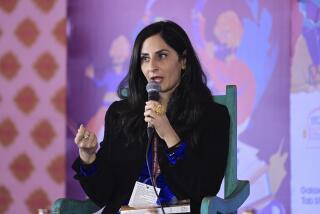A Clash of Ideas at Evangelical College
- Share via
WASHINGTON — Patrick Henry College, the small evangelical Christian school founded six years ago to train students for careers in public life, gained national prominence for placing many students in White House internships and other government positions. Now five of the school’s 16 faculty members have left, saying the school’s approach is too doctrinaire to prepare students for the realities of American politics.
One faculty member was fired and four others resigned in protest, saying the administration prohibited free-ranging discussions at what has been called the “Evangelical Ivy League.”
“There’s a failure for the school to live up to its stated purposes to lead the nation and shape the culture,” said professor David Noe, one of those who resigned from the college in Purcellville, Va. “If there is a de-emphasis on the liberal arts here, it will profoundly affect the college’s ability to place people in high office.”
The specific issues that led to the firing and resignations are abstruse, but they revolve around the question of how the ideas and writings of nonevangelical thinkers such as Catholics or the ancient Greeks should be treated in the classroom.
College President Michael Farris did not return telephone calls for comment Friday. A constitutional lawyer and ordained minister, Farris told the Chronicle of Higher Education this month that he founded Patrick Henry as a liberal arts college and values scholarship that is not Bible-based.
“What I don’t think is that we take the Greek philosophers and swallow it whole,” Farris said.
“I believe what the Scripture said, and that is that the wisdom of this world is foolishness with God,” he was quoted as saying.
College spokesman David Halbrook on Friday said claims that the school had been sacrificing the liberal arts were “absolutely, categorically wrong.”
The controversy began last fall after M. Todd Bates, a professor of rhetoric, delivered a lecture about St. Augustine’s search for truth that Farris faulted for not mentioning the Bible or the college’s Christian mission. Patrick Henry does not offer its professors tenure, and after Bates was criticized, he and eight other professors made a pact that if one of them was dismissed, the rest would leave in protest, Noe said.
The pact took effect this spring after Farris told government professor Erik Root he would not be rehired next year unless Root explained why he told a student, in the presence of one of her parents, that responding to a question by quoting Scripture was “simplistic.”
Noe and another professor wrote an article in the college magazine March 8 urging open discussions and saying Christians should not “hesitate to learn from a pagan.”
“There is much wisdom to be gained from Parmenides and Plato, as well Machiavelli and Marx,” the professors wrote. “When we examine the writings of any author, professed Christian or otherwise, the proper question is not, ‘Was this man a Christian?’ but ‘Is this true?’ ”
Farris wrote a critique in the student paper that the professors believed called their faith into question. They announced their resignations the next day.
Another professor, Robert Stacey, read the college’s “Biblical Worldview” and statement of faith to his class and asked anyone who thought he had betrayed them to leave (one student did).
In response, Farris fired Stacey, Noe said.
Clashes over principals are not uncommon among faculty at Catholic or evangelical schools, said professor John Green, senior fellow at the Pew Forum on Religion and Public Life. What is unusual, he said, is that the Patrick Henry professors spoke out.
“At Patrick Henry, they have a political mission as well as a religious one: They want to train students to bring their religious view into public policy,” Green said. Which makes the need for academic freedom all the more vital, he said.
More to Read
Sign up for Essential California
The most important California stories and recommendations in your inbox every morning.
You may occasionally receive promotional content from the Los Angeles Times.











